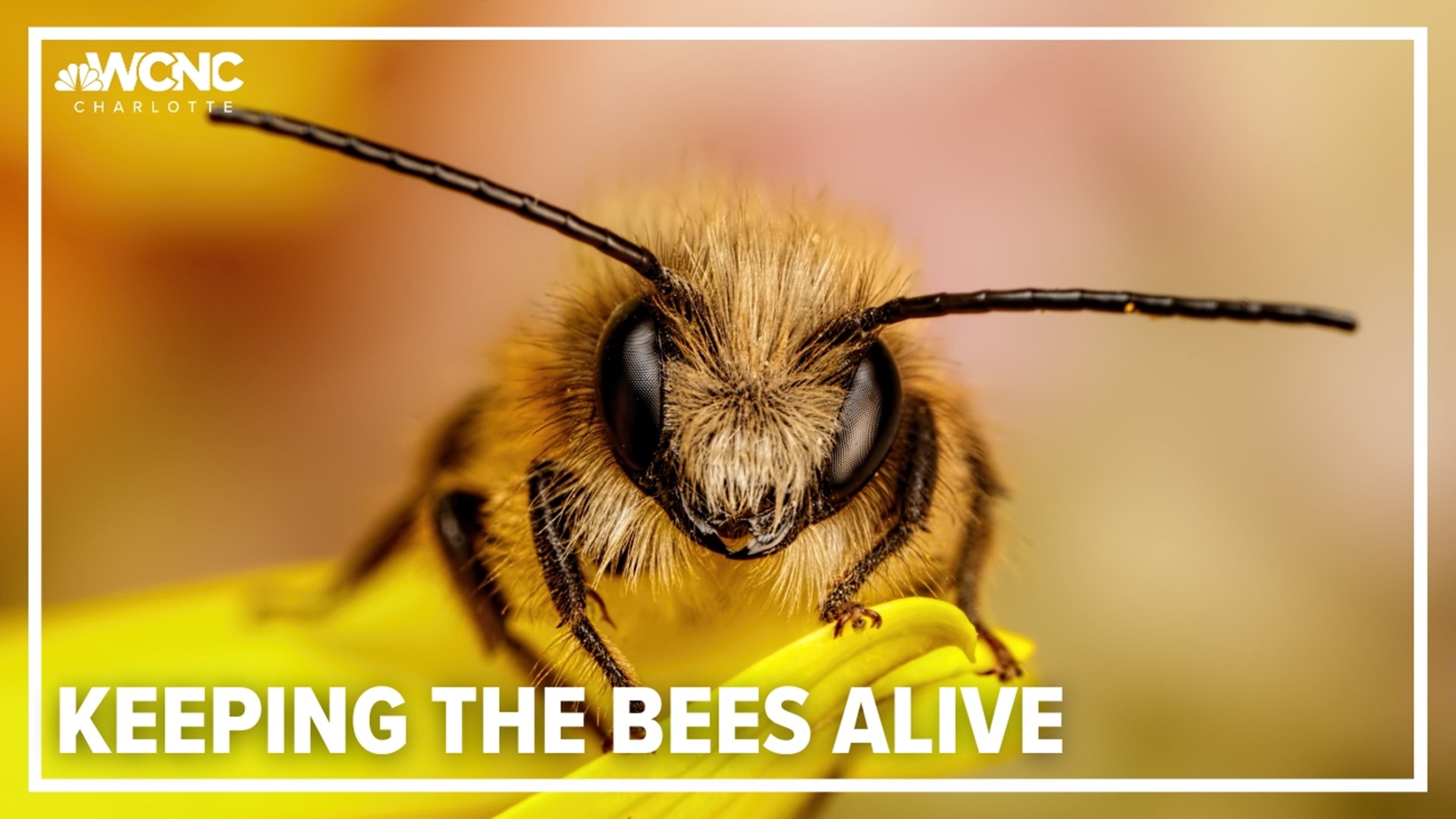CHARLOTTE, N.C. — "Buzz City" has taken on a whole new meaning now that Charlotte is partnering with the nonprofit Bee City USA.
Charlotte beekeepers are buzzing over the news after the city joined a growing list of cities enacting initiatives to grow the bee population.
Specifically, Charlotte joins 23 other North Carolina towns and cities in the program including Matthews, Belmont, Mount Holly, Gastonia, and Davidson.
Now that Charlotte is a “bee city,” it’ll partner with local beekeepers to educate the community on bees, enhance habitats, and reduce the use of pesticides.
"It is very important that we have bees because they support our agricultural system," explained beekeeper and owner of Queens Orders Honey, Justin Orders. "They're responsible for a third to a quarter of all the food on our dinner plate.”
According to Bee City USA, up to 40% of pollinator species may be at risk of extinction in the coming years worldwide.
In Charlotte, rapid development growth is leading to buildings replacing green spaces such as parks and woods. This leaves bees with fewer places to go. Orders said demolishing habitats is one of the reasons bees are dying off.
That problem exists with Charlotte’s tree canopy, which is dwindling.
However, the Queen City is trying to maintain trees and plants as part of new regulations designed to guide Charlotte’s development called the Unified Development Ordinance, or UDO.
Orders added that the Bee City USA initiative will likely also help with maintaining and growing plants. "Its most valuable point is teaching people that pollinators matter," he said. "That we can do individually a lot of things for pollinators; such as planting native species."
The Town of Matthews was one of the first municipalities in the U.S. to affiliate with Bee City USA in 2014. Gretchen Reid, chair of the town’s effort, said their outreach is working.
“It really has sparked a lot of interest and action coming out of it," Reid told WCNC Charlotte. She said the number one question she gets after people come across her program is, "How can we help?"
Charlotte’s Bee City committee is working to schedule meetings and get the community involved. A spokesperson told WCNC Charlotte that anyone interested in volunteering can sign up with Keep Charlotte Beautiful.
"We also want to encourage others to think beyond the honey bee and to recognize the true diversity of the native bees and other pollinators, and their vital role in sustaining our ecosystems and communities," Charlotte's assistant city arborist Vicki Aguilar, wrote.
Bee fast facts
Pike Nursery has tips on starting a bee garden.
Why are bees important?
- Bees are pollinators – moving pollen from flower to flower. Pollination is necessary for fertilization, and successful seed and fruit production for plants.
- U.S. Dept. of Agriculture says about one out of every three bites of food we eat exists because of pollinators. This is about 35% of the world’s food crops.
How do we start a bee garden?
First, think about location.
- Keep in mind most bee-attracting plants will need full sun, 6+ hours per day.
- Some folks may worry about getting stung. So when possible, plant your bee garden at the back of your property where there’s less human traffic. You’ll be less likely to disturb the bees and risk a stinging.
- Then, consider their 3 basic needs: food, shelter & water.
What do bees eat?
- They feed on pollen & nectar.
- Choose the right colors colorful of flowers
- Bees are attracted to blues and purples, as well as white and yellow
- Choose the right shape of flowers
- Bees like cluster blooms like lantana that are easier to land on and collect pollen
- Plant multiples of each flower & plant them in groups so they can be seen from the sky.
- Plan for continuous blooms from spring to fall
- Best bee-attracting plants include:
- Lavender & other herbs that go to flower
- Sunflowers & rudbeckia
- Zinnias
- Salvia
- Verbena
- Yarrow
- Goldenrod
- Dahlias
Contact Julia Kauffman at jkauffman@wcnc.com and follow her on Facebook, Twitter and Instagram.

